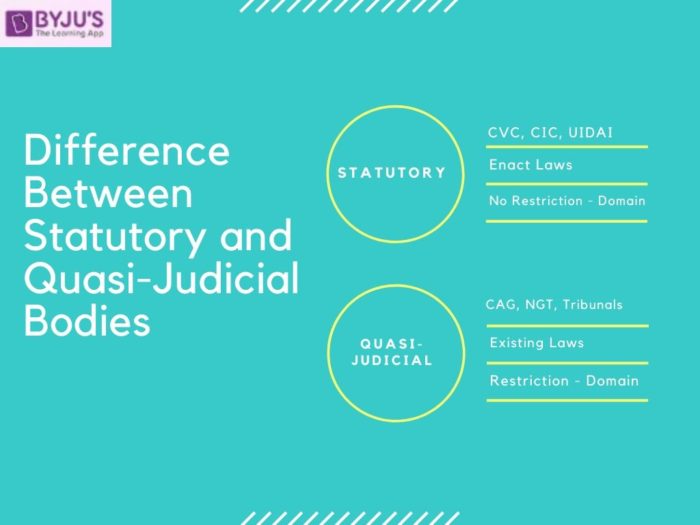Difference between Statutory and Quasi-Judicial bodies is explained here in detail. This topic is important from the perspective of Indian Polity Syllabus. Statutory Bodies are called ‘statutory’ since statutes are laws made by the Parliament or the legislature. A quasi-judicial body can be an individual or body with powers resembling a court of law. The difference between Statutory vs Quasi Judicial Bodies given here can help the UPSC Civil Service exam aspirants to understand the basics better and know their comparisons thoroughly.
Aspirants would find this article very helpful while preparing for the IAS Exam.
Difference between Statutory and Quasi Judicial Bodies – UPSC Notes:- Download PDF Here

The major difference between Statutory and Quasi-Judicial Bodies are:
| Statutory Bodies | Quasi – Judicial Bodies |
| These are non-constitutional bodies as they do not find any mention in the Constitution. | A quasi-judicial body can be an individual or body with powers resembling a court of law. |
| Some of the important Statutory Bodies are Central Vigilance Commission (CVC), Central Information Commission (CIC), Unique Identification Development Authority of India (UIDAI) | Some of the important Quasi-Judicial bodies are
Comptroller and Auditor General of India (CAG), National Consumer Disputes Redressal Commission, National Green Tribunal, Banking Ombudsman, Income Tax Appellate Tribunal, Railway Claims Tribunal etc. |
| All statutory bodies are established and operate under the provisions of their own enabling legislation, which sets out the purpose and specific powers of the agency. | Quasi-judicial activity is restricted to the issues that concern the particular administrative agency. These bodies are established to reduce the burden of the courts. Quasi Judicial Bodies can adjudicate and decide penalties on the guilty. |
| Statutory Bodies are not confined to specific domains or departments. An Example would be Central Vigilance Commission (CVC). Its role is to monitor all vigilance activity under the Central Government and advising various authorities in Central Government | Quasi Judicial Bodies powers are restricted to specific domains. Examples would be Central Administrative Tribunal (CAT), Income Tax Appellate Tribunal, Railway Claims Tribunal etc. |
| Statutory Bodies has the permission to enact laws | Quasi Judicial Bodies have to give decisions to disputes under the ambit of existing laws. |
After learning about the Statutory Bodies and Quasi-Judicial Bodies difference, it is better to know the details of Constitutional, Statutory and Quasi-Judicial Bodies thoroughly. Also learn more about Quasi Judicial Bodies like the Comptroller and Auditor General of India (CAG), Central Administrative Tribunal (CAT), National Green Tribunal (NGT); Statutory Bodies like Central Vigilance Commission (CVC), Chief Information Commission (CIC), and National Human Rights Commission (NHRC), thoroughly. Visit the below-given links to learn about the Central Administrative Tribunal, NGT, CVC, CIC and the facts on Constitutional, Statutory and Quasi – Judicial Bodies, Tribunals in India, in detail along with other information.These are the main differences between Statutory Bodies and Quasi-Judicial Bodies of India.The differences given in the above table can help the UPSC Civil Service Exam aspirants to answer any related questions easily in the exams.
- Constitutional, Statutory and Quasi-Judicial Bodies – An Overview
- Comptroller and Auditor General of India (CAG)
- Central Administrative Tribunal – Functions, Jurisdiction
- National Green Tribunal (NGT) – Objectives
- Central Vigilance Commission – Functions
- National Human Rights Commission – Functions, Composition
- Tribunals in India
- Difference between Lok Sabha and Rajya Sabha
- Difference between Legislative Assembly and Legislative Council
- Difference between Articles – Complete List (History,Geography,Polity and More)
UPSC Civil Service Exam aspirants should diligently study the Indian Polity Notes, as it is an extremely important component of UPSC Civil Service Exam Syllabus.
Difference between Statutory and Quasi Judicial Bodies – UPSC Notes:- Download PDF Here
The above details would help candidates prepare for UPSC 2023.
Related Links
| IAS Salary | Static GK |
| Interim Budget | IES Officer |
| Mauryan Empire | Parliamentary Committees |
| EXIM Bank | International Days List |
Relevant Links
Comments